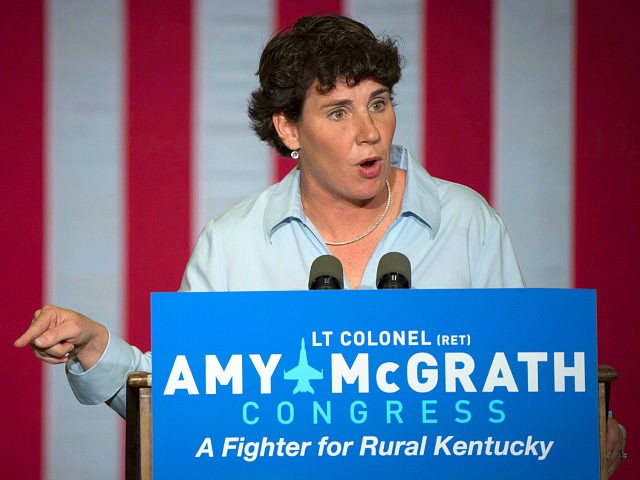Democrats may have violated campaign finance laws in their heavily funded effort to oust Senate Majority Leader Mitch McConnell (R-KY) this past election cycle, according to a new complaint filed with the Federal Election Commission (FEC).
The Campaign Legal Center, a public-interest watchdog, is accusing the campaign of McConnell’s defeated Democratic opponent, Amy McGrath, of having illegally coordinated with a super PAC, Ditch Fund, that was active in the race. Ditch Fund, which raised a total of $23 million this past cycle, placed advertisements lambasting McConnell and supporting his challenger through the same firm that was “strategically placing” McGrath’s ads as well.
According to the CLC’s complaint, the McGrath campaign placed its ads through the Washington, D.C.-based media firm Buying Time LLC. Ditch Fund, on the other hand, placed its ads with Buying Time through a shell corporation named Targeted Platform Media LLC. The second entity shares an address and phone number with Buying Time, as well as the same chief executive.
“Such use of a common vendor helped to ensure that spending by [Ditch Fund] would be complementary to, and coordinated with,” McGrath’s “own efforts,” the CLC argues.
Using such a tactic, CLC claims that McGrath’s campaign and Ditch Fund illegally coordinated on more than $8 million dollars worth of ad spending against McConnell.
Brendan Fischer, the CLC’s federal reform director, said in a statement announcing the complaint:
Super PACs can only raise and spend unlimited amounts if they are completely independent of the campaigns they support. When the same person is placing ads for both a super PAC and the candidate that super PAC supports, then the super PAC’s spending is not at all independent, as required by law.
“A vendor cannot possibly separate its work for a super PAC from its work for a campaign when the same person is placing ads for both—an employee cannot create a firewall inside their own head,” Fischer added.
FEC guidelines restrict the work that media placement firms can do for candidates and outside spending groups backing their efforts. Such guidelines are meant to ensure that vendors do not end up serving as links between candidates and the super PACs working on their behalf.
“Using a shell company to get inside information and coordinate their advertisements created an unfair advantage, violated the law, and may have resulted in millions of dollars in illegal and excessive in-kind contributions,” the CLC argues.
Despite the allegations, the purported scheme seems not to have made much of a difference to McGrath’s chances at ousting McConnell. In November, the Senate leader was reelected by voters in Kentucky by nearly 20 percentage points, even as McGrath outspent him by more than $30 million.

COMMENTS
Please let us know if you're having issues with commenting.